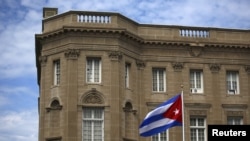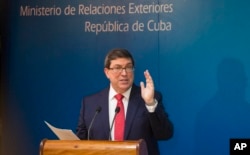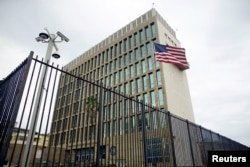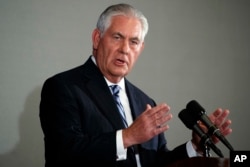Reaction has been mixed to the United States informing the Cuban government that it is ordering the departure of 15 officials from the Cuban embassy in Washington.
A senior State Department official told reporters Tuesday the Cuban diplomats have seven days to leave the country.
The announcement comes less than a week after the U.S. reduced its diplomatic presence in Havana following mysterious attacks on U.S. personnel in Cuba. The senior State Department official also said the number of American diplomats "medically confirmed" to have experienced health attacks in Havana has now been raised from 21 to 22.
Cuba has denied involvement in the attacks and said it is cooperating with the U.S. investigation. On Tuesday, Cuban Foreign Minister Bruno Rodriquez issued a statement calling the expulsions unwarranted.
"The Ministry of Foreign Affairs strongly protests and condemns this unfounded and unacceptable decision as well as the pretext used to justify it, for it has been asserted that the Cuban government did not take the appropriate measures to prevent the occurrence of the alleged incidents."
The new expulsion order for Cuban diplomats would in effect leave both countries with only emergency-level staffing at their respective embassies. The sudden deterioration in U.S.-Cuban ties comes after then-President Barack Obama's hopeful re-opening of relations after 50 years in 2015.
At Tuesday's State Department briefing, spokesperson Heather Nauert was asked repeatedly what the U.S. hopes to achieve by expelling the Cuban diplomats. Nauert insisted, "this is not punishment."
"We don't know who or what is responsible for these attacks," she added. "The people serving here in their embassy did what we believe some of the similar jobs [as our] folks down in the embassy in Cuba. We have a reduced ability to do our work in Cuba because of the attacks on our Americans, OK? They now will have a reduced ability do to their jobs, as well. OK? Let's move on to something else."
Reaction from U.S. lawmakers has been mixed, with several Republicans supporting it, and several Democrats opposing it. House Foreign Affairs Committee Chairman Ed Royce issued a statement praising the action.
"The State Department made the right decision in recalling nonessential personnel from Havana and expelling Cuban officials from Washington to hold Cuba accountable for the safety of Americans," according to his statement.
But the ranking Democratic member on that committee, Representative Eliot Engel, issued a statement saying he disagrees with the expulsion.
"It appears that this plays right into the hands of a potential rogue actor — Russia, perhaps — that is trying to create a further wedge between our two countries and other nations in the hemisphere. We need to be smart and thoughtful in responding to these attacks. Unfortunately, today's response was extremely shortsighted," he said in his statement.
Continued diplomatic relations
The State Department has not blamed Cuba for the health attacks and has not ruled out that a third country might be responsible.
In a statement released Tuesday, Secretary of State Rex Tillerson explained the decision to expel Cuban officials from Washington.
"The decision was made due to Cuba's failure to take appropriate steps to protect our diplomats in accordance with its obligations under the Vienna Convention," Tillerson said. "This order will ensure equity in our respective diplomatic operations."
The secretary said the U.S. continues to maintain diplomatic relations with Cuba and will continue to cooperate with Cuba on investigating the attacks.
On Friday, the State Department announced it would pull all nonessential diplomatic personnel out of Cuba in response to the mysterious "health attacks."
Over the past several months U.S. personnel in Cuba reported a variety of symptoms, including hearing loss, dizziness, cognitive issues and trouble sleeping. In a statement announcing the U.S. drawdown, Tillerson said investigators couldn't determine the cause of those health issues or who might be responsible.
On Tuesday, a senior State Department official said the U.S. still does not presume Cuban culpability for the attacks and still does not know who is behind them or how the attacks were carried out.
The American Foreign Service Association, or AFSA, is the professional association of the U.S. Foreign Service. AFSA's president, Barbara Stephenson, released a statement opposing the U.S. decision to reduce its staff in Havana.
"American diplomats need to remain on the field and in the game. We have a mission to do, and we're used to operating with serious health risks in many environments, whether it's parasites that rip up our guts in Africa, exposure to Zika virus and dengue fever, or air pollution in China and India," Stephenson said. "It's a complicated question regarding what is actually causing the health issues in Cuba, but our members are clear that they have an important mission to accomplish."







